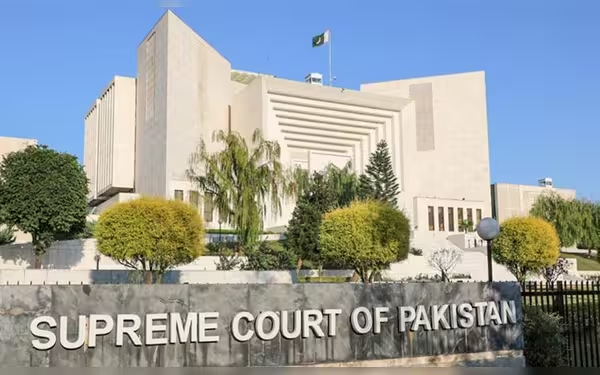Saturday, November 16, 2024 09:28 PM
Supreme Court Reviews Diamer Bhasha, Mohmand Dams Funding
- Supreme Court hears Diamer Bhasha and Mohmand Dams funding case.
- Chief Justice raises concerns over fund management practices.
- Court emphasizes constitutional adherence in financial matters.
 Image Credits: gnnhd
Image Credits: gnnhdSupreme Court of Pakistan reviews funding for Diamer Bhasha and Mohmand Dams, emphasizing constitutional adherence and financial management.
In a significant development regarding the funding of the Diamer Bhasha and Mohmand Dams, the Supreme Court of Pakistan convened a hearing on the matter today. The case has drawn considerable attention due to the implications it holds for the management and allocation of funds intended for these crucial infrastructure projects. Chief Justice Qazi Faez Isa, leading a three-member bench, expressed concerns about the manner in which financial matters are handled in the country, stating, "Many things are done in Pakistan without the constitution and law." This statement underscores the ongoing debate about governance and accountability in Pakistan.
During the proceedings, the court issued notices to several key parties, including the Attorney General and the Chairperson of the Water and Power Development Authority (WAPDA). The involvement of former Attorney General Khalid Javed and other judicial assistants indicates the seriousness with which the court is approaching this case. The Additional Auditor General presented findings that suggested no irregularities in the dam funds, yet Chief Justice Isa raised questions about the appropriateness of the account's title, emphasizing that judicial decisions should not overshadow constitutional principles.
The discussion also touched upon the financial health of the dam fund, which reportedly holds over Rs23 billion, with an additional Rs11 billion expected to come in. However, the Chief Justice pointed out the potential misuse of these funds, questioning whether they could be kept in private banks for markup purposes. The Additional Auditor General's response, indicating that such practices were unprecedented in his 37 years of service, further highlighted the complexities surrounding the management of these funds.
As the hearing progressed, the Chief Justice reiterated the importance of adhering to constitutional mandates, stating, "They will not look into the Supreme Court order regarding the construction of dams." This statement reflects a commitment to ensuring that the rule of law prevails over arbitrary decision-making. The court's inquiry into the government's role in managing the dam funds and the associated markup payments raised critical questions about transparency and accountability.
The Supreme Court's ongoing examination of the dam funds case is not merely a legal matter; it is a reflection of the broader challenges facing governance in Pakistan. As the court adjourned the hearing until Friday, the implications of this case will likely resonate beyond the courtroom, influencing public discourse on financial management and constitutional adherence in the country. The outcome of this case could set important precedents for how public funds are managed and safeguarded in the future, making it a pivotal moment for both the judiciary and the citizens of Pakistan.













